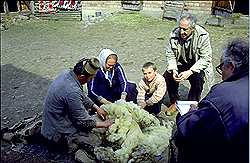|
|
 |
 |
 |
|
The
anthropologist in the field : Jean Cuisenier in Sirbi, Maramures,
Rumania.
|
|
From my first
days spent in Dobritsa in 1974 I had noted that most people of this village
conceived a passion for wine culture. Therefore, I multiplied my observations
and interviews on this theme to try to perceive my hosts' pragmatic motivations
: to produce wine cheap; their needs for sociability : to dispose of a
drink particularly appreciated for festive consumption; their symbolic investments :
wine is considered sacred since it is used in church liturgy. But we were,
my hosts and myself, in a situation determined by the political regime of
the time which rather valorized work in cooperatives than family work in
private orchards. I could not derive an interpretation from my hosts' pragmatic
motivations, nor from their symbolic investments without passing in the
opinion of some of them for a man who shares the ideals and values of the
regime. But if I tried a different interpretation deduced, for example,
from their need for sociability, I risked seeming to criticize implicitely
the regime. for its incapacity of formulating new modes of sociability practice.
So as to progress in my quest for information on wine culture I had therefore
to form my own opinion, each time with the help of my interlocutor, of the
situation that determined our relation. So, if the data collected depend
on the collector, they may also depend on the order of succession of his
observations and interwiews. This shows how far the collecting work summarizes
in its results the history of this collecting, how far it is an integrant
part of the collector's experience in the field, and even of his own life
"here" and "elsewhere".

|



